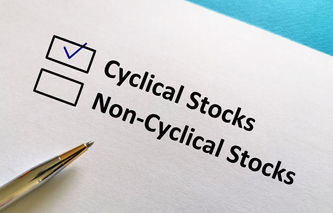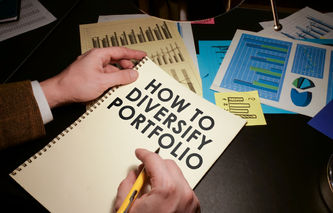During economic recessions, or market downturns, investors typically add defensive stocks to their portfolios. These stocks can be expected to perform relatively well during all phases of a business cycle, even during difficult economic conditions. In this article, we're going to help define what is meant by a defensive stock. As part of that definition, we're going to explain how to identify these companies. We're also going to talk about the pros and cons of investing in these stocks, including the best time to buy them.
Defensive Stock Theory
A defensive stock is usually associated with a company that belongs to an industry or market sector that is unaffected by business cycles. That is to say, consumer demand for their products or services remains strong no matter how well, or how badly, the economy is performing. Defensive stocks are the opposite of cyclical stocks, whereby the financial health of cyclical companies move in-sync with the health of the economy. That's why these stocks are also referred to as noncyclical stocks.
Identifying Defensive Stocks
The easiest way to identify a defensive stock is by thinking back to the very basic needs we all have as human beings: food, health or well-being, clothing, and shelter. If a company provides a service, or manufactures a product, that fulfills these needs, then it's very likely consumer demand for their products or services will remain strong even when economic times are dire. Examples of defensive stocks include companies belonging to the following market sectors:
Utilities: including electricity, natural gas, propane, heating fuel oil, and water. At one time, this list would have included telephone and cable television companies, but competition has eliminated the "captive" customers these companies once enjoyed when they owned franchise territories.
Food and Beverages: including producers of food products, beverages (including those containing alcohol), and sometimes fast food restaurants that compete for customers based on the price of their offerings.
Healthcare: includes companies that manufacture pharmaceuticals and medical devices, testing laboratories, and insurance companies.
Non-Durable Goods: includes household goods that are quickly consumed such as soap, detergent, deodorant, and toothpaste. These are essential household items that most consumers will purchase even if money is tight.
Stock Beta and Noncyclical Stocks
The concept of stock beta is fairly easy to understand. It's a measure of individual stock risk relative to the overall risk of the stock market itself. It's also sometimes referred to as financial elasticity. By their very nature, noncyclical stocks have lower than average systematic risk. Two generalizations we can make about the beta calculation include:
If the stock's price experiences movements that are greater (more volatile) than the stock market, then the beta value will be greater than one.
If a stock's price movements or swings are less than those of the overall stock market, then we should expect the stock's beta value to be less than one.
Defensive stocks: Also referred to as noncyclical stocks, the financial health of these companies do NOT move in sync with the economyMoneyzine Editor
The above relationships tell us that a defensive stock will tend to have a beta value that is less than 1.0. Since we also know that less volatility means lower risk, then we'd expect defensive stocks to provide investors with an overall lower return on investment.
Pros and Cons of Investing in Defensive Stocks
The biggest advantage an investor gains through the purchase of defensive stocks is a conservative portfolio, which should provide above-average returns during a recession. The profitability of these stocks will hold up during these hard economic times because the demand for the products or services of these companies is relatively inelastic. That is to say, even when money is tight, consumers' demand will remain relatively unchanged. The same attributes that allow these companies to provide above-average returns during a recession, will also result in below-average returns when an economy rebounds. This is the biggest disadvantage of investing in a noncyclical stock. They neither fall as fast as other stocks during a bear market, nor rise as fast as other stocks during a bull market.
When to Buy Defensive Stocks
The best time to buy noncyclical stocks is just before the economy enters a downturn. That's the reason they're referred to as defensive stocks. They can provide investors with a safety net during turbulent times. Once a market is firmly entrenched in a bear market, it's often too late to invest in a defensive stock. Finally, the worst time to invest in this class of stocks is at the start of a bull market. With a beta of less than one, these stocks can be expected to return less-than-average profits when the rest of the stock market is climbing higher.








